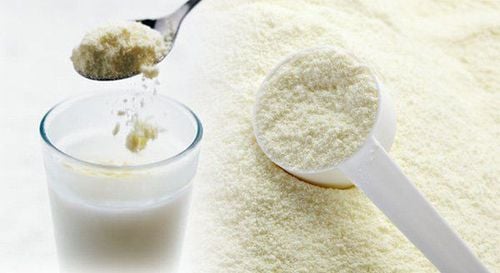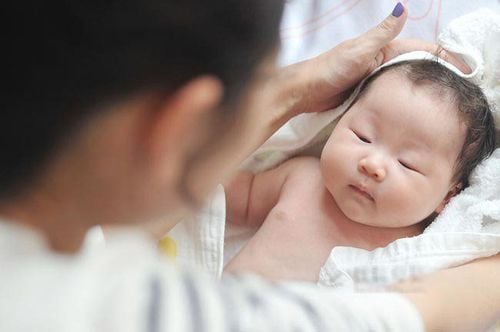This is an automatically translated article.
The article is professionally consulted by Resident Doctor Ho Thi Hong Tho - Neonatologist - Pediatrics - Neonatology Department - Vinmec Phu Quoc International General Hospital
Getting into a habit with your baby is a difficult job with a specific nature. The cues need to be recognized by the parents to develop a schedule of eating, sleeping, and play that is appropriate to the baby's needs and to the family's routine. Babies 1-2 months old communicate with the outside world mainly through crying, most common between 6 and 8 weeks and usually occurs in the late afternoon or early evening. Doctors advise parents to apply the following measures to soothe babies such as: swaddling, holding the baby to the side or belly (in your arms), shrugging, rocking and feeding.
1. Baby's needs from 1 - 2 months old
It really helps to refer to what other parents are doing. We asked parents of 1- and 2-month-olds to share their baby's daily schedule, then selected some of the samples below as representative. Before formulating a baby schedule, however, keep in mind that over a 24-hour period, most 1 and 2 month old babies need:
350 - 600 ml of breast milk or formula. You need to know how to recognize that your baby is getting enough milk through signs such as good sleep, smooth skin, frequent urination, and no fussing. Approximately 16 hours of sleep in a day, including nighttime naps and daytime naps. Three naps during the day in the morning, afternoon, and evening are typical. Time to play, develop muscles also play an important role, while also practicing new skills and interacting with you. Try reading to your baby, giving her a massage or bath, or going for a stroll in the stroller.

2. Feeding schedule of 2 months old baby with formula milk
Feeding schedule for 2 months old baby with formula is as follows:
5 am: Baby wakes up and feeds early in the morning with about 120 - 180 ml of formula. Babies can go back to sleep later, which allows parents to get more sleep! 8-9 a.m.: Baby wakes up and takes another bottle of milk. 9am to 12pm: Playtime. I try to spend as much time playing with you as possible. Your baby is going through the infant stage and loves to be rocked. This is really difficult, especially when you need to look after many other children at once. She doesn't understand that parents also need to focus on other siblings in the house. The most effective method is to place your baby in a separate bassinet and rock it by hand. During that time, the mother can take care of other children, especially when they are younger than 5 years old. 12:30: Mother and baby have lunch. Give your baby a bottle of formula then he'll fall asleep after lunch. 4 p.m.: Baby continues to feed on another bottle of formula. 4:30 pm: Playtime. After waking up from a nap, the baby is taken out to play with the family, maybe an hour before dinner. Dad also usually comes home around this time, and can play with the kids while mom cleans the house, washes dishes, etc. 6 to 7 pm: Dinner. 7 to 8 p.m.: Baby bottle-feeds and sleeps. 8-9 p.m.: Bath time and bedtime for the rest of the family. 12 a.m.: Baby gets a bottle in the middle of the night and then it's time for mom to go to bed. 3 a.m.: Continue breastfeeding.

3. Infant feeding schedule from 1 to 2 months with breast milk
Infant feeding schedule 1 - 2 months old with breast milk:
7:30 to 8 am: Wake up. 8 a.m.: Breastfeed your baby. Properly latch on to the nipple and empty the milk from each breast. 9am: Baby falls asleep and naps until noon or 1pm. 1 p.m.: Continue breastfeeding. If breast milk is secreted too much, but the baby sucks less or the mother has to go to work early, it is possible to squeeze some milk from the mother's breast into a feeding bottle and store it in the refrigerator. Each feeding feeds your baby from 180-200 ml of milk from the bottle.
Let your baby play in the middle of the floor with baby safe toys, you can walk around the house and tell your baby about everything. Mom sings, or mom and baby sit on the porch or go shopping. Some babies will actually show interest in lying on their changing table and talking to their mother.
4 p.m.: Continue breastfeeding. After a long morning nap, your baby will take a 15-minute nap or two. Mom will start having trouble around 5pm. This is when your baby starts to fuss if he doesn't sleep in the afternoon.
Bath time is 7pm or a little earlier if baby is uncomfortable. Mom gives the baby a bath every day if the baby really feels relaxed in the water. However, mother only uses soap sparingly. On days when soap is not used, the mother only bathes the baby with regular tap water. After the bath, the baby is massaged with baby-specific exercises with lotion while the mother sings to the baby to listen to children's songs.
7:30 or 8 p.m.: Baby gets extra breast milk. After breastfeeding, the mother should hold the baby on her shoulder and pat the baby on the back to push out the excess gas in the stomach. Mother put the baby down in the crib, said love to the baby and turned on the familiar sounds of the baby. Mother let the baby "talk" to sleep.

Taking care of babies and young children is never easy, especially for first-time parents. Children not only need to be provided with adequate nutrition, but also have to ensure a scientific play and sleep schedule.
Pediatrics department at Vinmec International General Hospital is the address for receiving and examining diseases that infants and young children are susceptible to: viral fever, bacterial fever, otitis media, pneumonia in children, ... With modern equipment, sterile space, minimizing the impact as well as the risk of disease spread. Along with that is the dedication from the doctors with professional experience with pediatric patients, making the examination no longer a concern of the parents.
Please dial HOTLINE for more information or register for an appointment HERE. Download MyVinmec app to make appointments faster and to manage your bookings easily.














